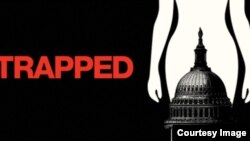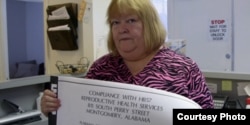On Wednesday, as the U.S. Supreme Court heard arguments over a law that critics say places unreasonable restrictions on abortion, filmmaker Dawn Porter premiered her new documentary, "Trapped."
The film is Porter's argument that laws like HB2 — the Texas law before the Supreme Court — have little to do with women's health and are instead designed to make it harder for women to get an abortion.
Since 2011, hundreds of laws regulating abortion clinics have been passed by conservative state legislatures, particularly in the South. Supporters say the laws are designed to make abortion safer.
But critics call these restrictions Targeted Regulation of Abortion Providers, or TRAP laws. They argue lawmakers are trying to restrict or eliminate access to safe abortions.
Porter and other critics also contend these laws disproportionately affect poor women and women of color, who face the closure of local clinics and don't have the means to travel and pay for a procedure.
Compliance nearly impossible
"Trapped" follows a small number of abortion clinics in the states of Alabama, Mississippi and Texas as they deal with the challenge of staying open while complying with new regulations imposed by their state.
June Ayers, the owner of one of the Alabama clinics, says conservative politicians are behind Texas' HB2 law, and many of the state's clinics find it nearly impossible to comply with its mandates.
“That was the function of the bill. The function is a trap,” she said.
One HB2 regulation requires abortion clinics to be ambulatory surgical centers.
In a court brief, opposition groups argued those upgrades are often prohibitively expensive. They also point out that the American Medical Association and the American College of Obstetricians and Gynecologists say the regulations are unnecessary, and actually put women's health at risk "by restricting access to abortion providers."
According to the documentary, the bill also requires many facilities to widen corridors to allow gurneys to pass through and include surgical equipment not used in abortion procedures.
These restrictions, says Dalton Johnson, owner of an abortion clinic in Huntsville, Alabama, are intended to chip away piecemeal at women’s reproductive rights.
“I’ve spent close to a million dollars to meet all of their requirements and you think you are done and what are they trying to do? They are trying to pass another bill that is saying I cannot be within 2,000 feet of a school. They are treating me, the patients, the physicians, as sex offenders,” he says in the film.
Speaking to VOA Wednesday outside the U.S. Supreme Court building, Elizabeth Graham, the director of Texas Right to Life, defended HB2.
“Ambulatory surgical center requirements are the basic standard of care in surgery centers across America and although we do not want women to feel abortion is their only option, when they do make that tragic decision at the very least they should have the expectation that they will be cared for and that they will not be further victimized or maimed by the procedure or by substandard health conditions at the clinic,” she said.
"Trapped" Director: Laws Put Women at Risk
But filmmaker Dawn Porter told VOA these laws are a pretext for eliminating the right to abortion.
"The laws are passed by politicians who say that they are for women’s health but if you look at the legislative history, if you look at the states that are actually passing the laws, they are all by politicians who have vowed to make abortion, in the words of [Texas] Governor Rick Perry, a thing of the past," she said.
According to "Trapped," women, especially low-income women, pay the price of these restrictions.
Marva Sadler, a director of clinical services at a Texas clinic, says in the film, "Because of this crazy law, it is impossible to find people to work for us."
She tears up while talking about a young girl who requested an abortion.
"She is 13 years old and she is the victim of rape and she drove four hours from McAllen to San Antonio and we had to turn her away," she said. "And there was nothing I could do to save her."
The film suggests that anonymous victim is one of hundreds of thousands who may end up trying to self-abort and hurting themselves. According to the documentary, up to 240,000 women in Texas alone are estimated to have tried to end pregnancy themselves, without medical assistance.
One abortion care provider said, "I remember getting a call from a patient. She asked me 'What if I told you what I have in my kitchen cabinet and you tell me what I can do.'"
The Supreme Court's ruling on HB2 will be released later this year.






